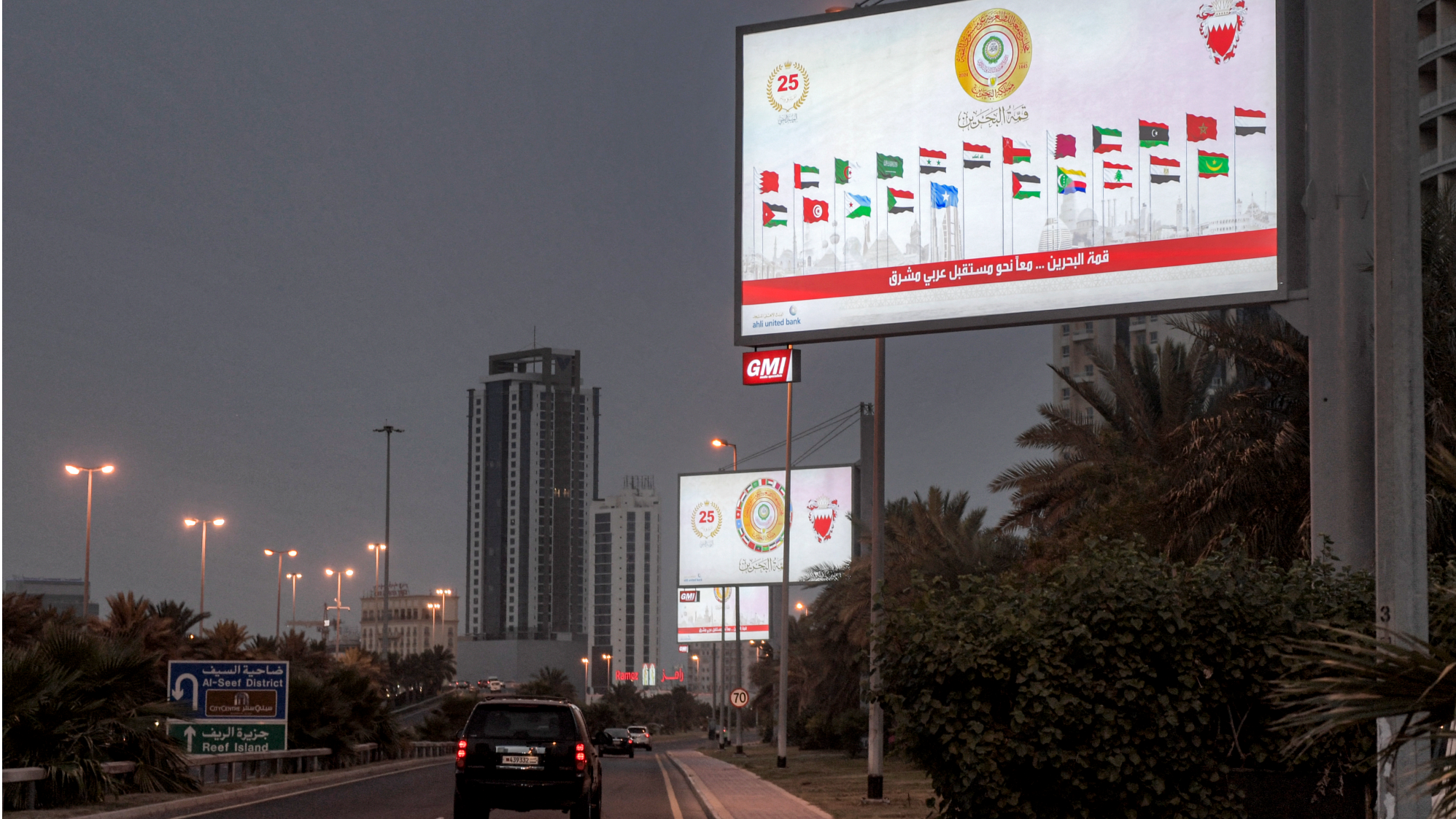
The 33rd Arab League Summit got underway in Bahrain on May 16 with leaders expected to prioritize efforts leading to a Gaza cease-fire deal as the mass displacement of Palestinians continued amid intensified Israeli incursions.
While in the Bahraini capital Manama, the Arab heads are set to adopt the “Bahrain declaration” calling for a peace conference on the Palestinian-Israeli conflict, Chief of Arab and African Affairs at Bahrain’s Ministry of Foreign Affairs Ahmed Al Turaifi told United Arab Emirates newspaper The National.
The Manama meetings came as Palestinians marked the 76th anniversary of the Nakba on May 15. Meaning “catastrophe” in Arabic, the Nakba refers to the mass displacement and dispossession of Palestinians that occurred in 1948 following the establishment of the state of Israel
Further, Al Turaifi said that what made this year’s summit different was that the world “has finally awoken following the tragedy of the people in Gaza”, noting the overwhelming support at the recent United Nations General Assembly vote for broadening Palestinian rights, indicating “the two-state solution was the only path forward”.
READ MORE: Wang Yi meets Arab League chief on practical cooperation
At his speech during the preparatory meeting of Arab Foreign Ministers of the 22-member Arab League on May 15, Saudi Minister of Foreign Affairs Prince Faisal bin Farhan emphasized Saudi Arabia’s firm principles of defending the Arab aspirations and strengthening its foundations of peace, stability, and development.
He said his country made all efforts to gain international support “to stop the brutal Israeli attacks” and establish an immediate and permanent cease-fire in Gaza.
The Manama meetings came as Palestinians marked the 76th anniversary of the Nakba on May 15. Meaning “catastrophe” in Arabic, the Nakba refers to the mass displacement and dispossession of Palestinians that occurred in 1948 following the establishment of the state of Israel.
Israel meanwhile marked a subdued celebration of its 76th Independence Day on May 14 with protests against the government and reports of deepening internal rifts within the cabinet of Israeli Prime Minister Benjamin Netanyahu over his purpose of prolonging military operations in Gaza and post-conflict plans.
The summit also comes as international aid organizations released a statement on May 15, blaming world leaders for “failing to act” as the Israeli military pushed into Rafah and singling out the United States for bearing a “significant responsibility” for Israel’s International Humanitarian Law violations.
Twenty organizations were signatories of the statement. They included Oxfam, ActionAid, Action Against Hunger, Médecins du Monde France, and Relief International among others.
The statement read that “Third States” have the responsibility to urgently act to end and then pursue accountability for, the “Grave Breaches of IHL (International Humanitarian Law) taking place in Gaza”.
The statement also noted that despite repeated calls from leaders, UN officials, and humanitarian nongovernmental organizations to refrain from expanding its ground offensive to Rafah, Israeli troops entered on May 7, putting 1.5 million people, including 600,000 children, at serious risk
“The first step for Third States in upholding their own legal obligations to ensure IHL is respected is to stop the Rafah invasion, open all land crossings, and lift internal barriers for humanitarian access. As the main weapon provider for Israel’s military effort, the United States bears a significant responsibility for Israel’s IHL violations,” it said.
“In addition to halting the transfer of high payload bombs, the US should also use all its leverage to halt the ongoing military operation in Rafah.
“In fact, all suppliers of arms have to respect the Human Rights Council resolution voted on April 5 calling on them to cease the sale, transfer, and diversion of arms, munitions, and other military equipment to Israel,” the statement said.
All states must act now to ensure an immediate and sustained cease-fire,” it added.
The statement also noted that despite repeated calls from leaders, UN officials, and humanitarian nongovernmental organizations to refrain from expanding its ground offensive to Rafah, Israeli troops entered on May 7, putting 1.5 million people, including 600,000 children, at serious risk.
It said that more than 450,000 Palestinians have fled Rafah since Israel first issued unlawful “evacuation orders” on May 6.
The “new evacuation orders” on May 11, it said, were setting the stage for further advancement of “military invasion” that would “lead to the total collapse of life-saving services”.
READ MORE: Joint Arab-Islamic summit slams Israel's attacks on Gaza
It also accused the Israeli military offensive of interrupting the flow of aid to Gaza through Rafah and the Kerem Shalom/Karem Abu Salem crossing, Gaza’s main cargo terminal.
“The only result of the ongoing ground invasion in Rafah is that more human suffering is caused. People are being forcibly pushed into the already overcrowded so-called ‘humanitarian zones,’ where many people cannot even find shelter,” said Jamil Sawalmeh, ActionAid Palestine country director.
“It is time to put maximum pressure on Israel and the international community to end the repeated forcible displacement of the people of Gaza. It is equally important to ensure the reopening of the Rafah crossing, which is the only lifeline for more than 2 million vulnerable people,” he added.
Contact the writer at jan@chinadailyapac.com


